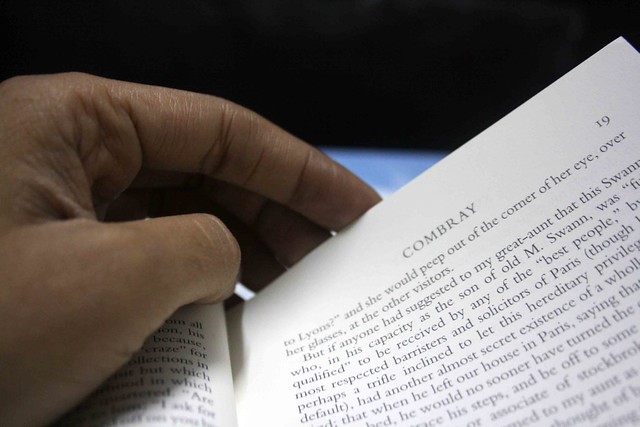
City Reading – The Delhi Proustians – II, Indian Coffee House

A la recherche du temps perdu.
[Text and photos by Mayank Austen Soofi]
Today is the second meeting of The Delhi Proustians, a club for Delhiwallas wanting to discuss French novelist Marcel Proust. Every Sunday noon we have to read his masterpiece, In Search of Lost Time, for an hour. Since it was Christmas last Sunday, the club’s second meeting was moved to Tuesday evening.
It is 7.05 pm and I’m alone at the table. The seven volumes with their more than 3,000 pages and 1.500,000 words will change my life.
By tramping through the first few sleep-inducing pages (which, I suppose, are about a man who has woken up at midnight), and acclimatizing myself to long-winded lines, I will become a permanent resident of the Proust country, in which no feeling, whether it is stirred by a beloved, a building, a painting, or a piece of music, is left unattended.
The 4-pack hardbound boxed-set of Everyman’s Library edition, translated by C. K. Scott Moncrief and Terence Kilmarti, revised by D. J. Enright, and introduced by Harold Bloom, is available at amazon.com for $122. I acquired it from the Fact & Fiction bookstore in Basant Lok Market. A new edition by Penguin has Proust’s novel translated by seven different people. The first, In Swann’s Way, translated by short story writer Lydia Davis, was hailed by Los Angeles Times as “clear and true to the music of the original.”
Finishing the novel will take at least a year. By then I hope to learn to look at Delhi the way Proust dissected life.
To commit myself to In Search of Lost Time, I’ve ornamented my copy of Swann’s Way with relics of my past. The first page has a photo of my childhood where I’m sitting with my sisters. The second page has another photo of ours – from yet another time. Those days are my lost paradises.
Indeed, the first part of Swann’s Way is named after an imaginary village called Combray, whose memories are invoked by Proust’s Paris-based narrator as he remembers spending his childhood vacations there.
My Combray is Nainital, where I was born. The Himalayan lake-town is an overnight train ride from Delhi. A few months ago I went there after a decade, and passed an afternoon standing at one corner of the Bara Bazaar in Mallital, trying to look for my mother in the crowd. Many years ago, when we were living there, every Monday she would walk down the bazaar’s steep slope from our house up in a hill to shops on the Mall Road; she would be holding my hand; my eyes constantly darting around for vendors selling budhiya ke baal, the pink fluffy cotton candies. Midway when my legs would start to hurt – it happened each time without fail for I was a weak child – mother would absentmindedly pick me up, snuggle me into her arms, and continue to walk.
In Delhi, I walk alone.
The third meeting of The Delhi Proustians takes place on 1st January, 2012.
Where Indian Coffee House (it has three seating spaces; enter the enclosed area that looks to Baba Khadak Singh Marg), Mohan Singh Place, near Hanuman Mandir, Baba Kharak Singh Marg, Connaught Place Time 12 noon Nearest Metro Station Rajiv Chowk
Solitary pursuit
Times lost
Paris-Delhi
Beginnings
Part I – Combray
Reading pleasure
Here’s Marcel









Stood up again in a venue worthy of such a pursuit. A sad tale plainly told. Alas.
You, however, are steadfast. If you can endure such disappointment for another week, I guarantee at least one old, non-French-speaking firanghi for January 8’s session.
Perhaps, without much to your awareness, you are writing history — of your own! Someday, someone shall be doing the same, except they shall be reading volumes on M.A.S!
Lovely post!
Shaheen